Feeling drained from the night before? It could be an emotional hangover

The day following Valentine’s Day, I awoke with a tiny pit in my stomach, foggy eyes, and fuzzy head.
I hadn’t gotten too drunk. Neither had I been rejected, ignored, or broken up with. Indeed, I am contentedly wed to a man who scowls at the Hallmark holiday but understands how to win me over with beer and wings, which we had enjoyed the previous evening along with a kind of variety show at our friend’s Brooklyn apartment. It had seemed like the perfect night on the surface. However, my intuition told me otherwise.
It brought to memory that I had been covering a story about mental health the day before that had really ingrained itself in my mind. When I tried to talk to a relative about it, I felt misunderstood. Since I’m a sucker, I had sobbed throughout the first musical act of the performance.
On February 15, I, like many others for various reasons, woke up with an emotional hangover, which is that woozy, uneasy feeling that remains after a long talk, therapy session, or even a scary movie. According to experts, the “condition” is rather frequent even if it is not an official medical term and makes sense from a physiological and psychological standpoint.
“Our internal world influences our external world, and our internal world is shaped by our experiences from yesterday,” said Lila Davachi, PhD, a Columbia University psychology professor who has researched the impact of emotions on memories. “Every morning, we are not just empty vessels.”
I already felt better. Here’s what else I discovered about the causes of emotional hangovers, the people who are most susceptible, and whether or not there is anything we can do to soothe or avoid them. Warning: Even if you’re sober, rest and water are tried-and-true hangover remedies.
Defining the emotional hangover
Emotional hangovers mean different things to different people. The psychiatrist and author of The Empath’s Survival Guide, Judith Orloff, MD, may be the most well-known person to characterize it as “an energetic residue” from a relationship with a “energy vampire,” or someone who purposefully or unintentionally drains your mental and emotional vitality.
According to her, “toxic emotions can linger long afterward, which makes you feel ill, exhausted, or plagued by brain fog.”
In my case, the circumstances that were extremely taxing but didn’t go away just because the sun was rising again were what I needed to heal from, not any specific person. (It’s important to note that I’m not referring to the emotional fallout from catastrophic life events like the death of a loved one, which is better described as grieving and should be given time to heal.)
I’ve experienced emotional hangovers following the completion of eerie books, hate mail from readers, and arguments with my spouse.
According to therapist and coach Megan Bruneau, “it’s normal to feel lingering feelings of sadness or shame the day after something that’s really intense.” According to the mental health website Choosing Therapy, the idea reminds her of “vulnerability hangovers,” which are painful emotions like remorse and anxiety that might surface after disclosing intense needs, desires, or emotions.
Orloff states that those with social anxiety disorder, empaths, and extremely sensitive people are more likely to have recurrent emotional hangovers. Put differently, little social blips become magnified when your emotional antenna is extremely attentive to others’ thoughts and behaviors. For some people, what appears as a wind may be a gust on yours.
Abby Schaeffer, a 33-year-old New York City-based flight attendant, finds resonance in this viewpoint. “I have intense emotional reactions; when I argue with someone, I get quite upset about it. In contrast, my companion says, “Well, they’re wrong, but whatever,”” the speaker stated. “Emotional hangovers are a real thing for people like me because it takes so much energy to process the event.”
The brain and body during an emotional hangover
The physical effects of excessive alcohol use, such as dehydration, poor sleep, and other factors, are well-known causes of hangovers; however, the mechanisms underlying emotional hangovers are less clear from a medical standpoint. However, specialists have a few theories.
First of all, when you go through an emotional experience, like confronting a lazy coworker, your fight-or-flight response is triggered, which causes stress hormones like adrenaline, cortisol, and norepinephrine to shoot through your body. You may feel particularly exhausted after the initial “rest and digest” phase of your body. It’s exhausting to mend after the stress response, according to Bruneau.
The sensation may possibly be a result of a mental struggle going on between your prefrontal cortex, which tries to control your emotions through reason and judgment, and your amygdala, which processes your emotions. According to Bruneau, “trying to be non-reactive while controlling your feelings of anger and anxiety is mentally taxing.”
Additionally, several studies reveal that the brain is activated in specific ways during intensely emotional experiences, and that activation does not cease when the event concludes. Davachi et al. (2016) observed participants’ brain activity during the viewing of neutral and emotional images, and their findings were published in the journal Nature Neuroscience. Researchers discovered that the subjects’ recollection of later, non-emotional images was enhanced by the brain states linked to the emotional experiences, which persisted for 20 to 30 minutes.
According to Davachi, it demonstrates that “we’re much more complicated in how we’re viewing, perceiving, and remembering the world,” in contrast to a video recording.
Similar to how emotional occasions can taint our focus, they can also make us misinterpret a friend’s quiet following an embarrassing interaction with a different friend or highlight happy-looking couples following a quarrel with our partner. You’re (often unknowingly) slowing down your healing process when you dwell on bad emotions.
“You may be suppressing everything else, but your perception is being heightened toward the things that are relevant to that person or that trauma,” claims Davachi. Additionally, it is maladaptive as, for example, if you receive a nice note in the mail or experience other positive events, you won’t allow them to lift your spirits as they should.
It’s possible that your emotional hangover won’t be too bad: Perhaps you were too preoccupied with a depressing movie to take the time to eat healthily, drink enough water, or breathe deeply. It’s also possible that you slept more restlessly. According to Bruneau, “we tend not to take care of ourselves as well when we’re stressed.”
Emotional hangovers are ultimately proof positive that our brains and bodies are intertwined, says licensed social worker Kristen Guest. “If our minds are overworked or overstimulated, our bodies will undoubtedly sense it. Nothing occurs in a vacuum.
Your emotional hangover first-aid kit
Emotional hangovers are normal; they are not always harmful. They may indicate that you need to practice sitting with difficult emotions and conflict, or you may need to establish better boundaries or communicate better. You may need to take more dramatic action, such as quitting your work or breaking up with a pal, if you find that the feelings are bothersome and frequent. Think about giving up the metaphorical substance that isn’t helping you any more.
“In certain situations, it’s beneficial to receive those signals, and we must teach our bodies and minds to react differently,” adds Guest. In order to help you see trends in what, where, and who tends to emotionally drain you, she suggests journaling and drinking a lot of water. She asserts that it’s critical to set aside time for introspection.
Writing it out and working through it with a therapist can also be quite beneficial, as student of social work Emily Hein has discovered. For instance, she now knows that an excessive response to her present partner’s remark could be connected to something that her ex-partner said.
“We have a tendency to combine all of these things, and it can be difficult to say, ‘No, let’s just handle this specific situation as it is,'” she adds. “There’s undoubtedly a push-pull between your body and mind when it comes to knowing you’re safe and acknowledging that it’s acceptable for your brain to not feel comfortable. Your mind is compiling evidence from actual events.
She finds that taking a stroll, playing a video game, or watching a show can all help her put some distance between the incident and her response. Schaeffer has also discovered that time heals, much like a hangover from a margarita. Simply treat yourself nicely the following day, she advises. That’s the guideline I adhere to.




